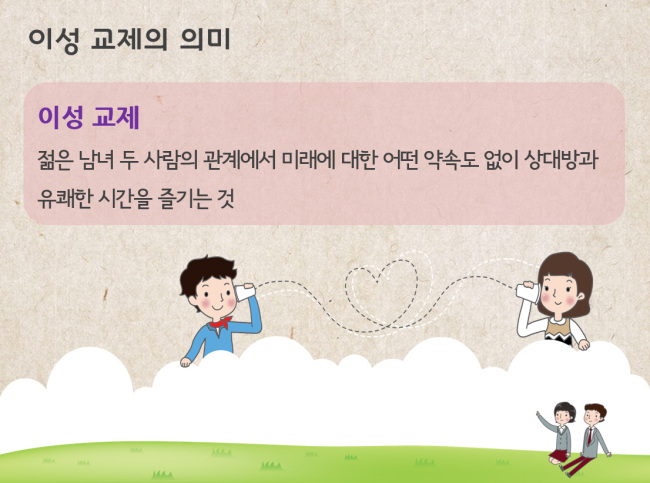South Korea’s official teaching aid for sex education is under criticism for some of its content, including its definition of dating and a section on date rape.
According to PowerPoint slides provided by the Education Ministry, which is currently available to the public online, dating is defined as “a process for young men and women in a relationship without any commitment for the future.” The teaching aid also states that teenage dating “does not lead to marriage” in another slide.

Government’s teaching aid for sex education for teenagers defines dating as “a process for young men and women in a relationship without any commitment for the future.”
The material also encourages teens to wear “appropriate clothes or school uniforms” when dating, ensuring it does not affect their academic obligations, and that each person pay for their own expenses on dates.
It also stated “the unfair practice (of men) paying for date expenses” as a cause for date rape or other forms of sexual abuse by a romantic partner.
“The teaching material’s definition of dating contains the traditional notion that teens should not be sexually active, as it is implying that a serious commitment occurs when there is a sexual intercourse,” said Jeong Hae-sook, a researcher at the Korean Women’s Development Institute.
“The definition is also ageist by specifically stating ‘young people’ as the only people who are entitled to date.”
Lee Hyun-sook, who heads the Korea Youth Sexuality Center in Seoul, said encouraging teenagers to “dress appropriately” is linked to the notion of blaming victims for sexual violence. “We often see the public blaming the victims for ‘wearing a dress that is too short’ or ‘having caused the trouble for herself.’ The materials are advising young people to minimize their risk by dressing in a certain way,” she said.
“But what the public needs to learn is that no matter what the victim was wearing or doing at the time of the attack, sexual violence cannot be justified. If a person is not happy with paying all of the expenses on dates, then he or she has the choice of ending the relationship. It does not give them a reason to abuse their partner.”
In its chapter on date rape, the teaching aid has a PowerPoint slide titled “why it is difficult to say no to others’ requests.” In the slide it says “it is ideal to accommodate other people’s requests, but it’s not always possible when interacting with others.” Researcher Jeong said the slide is one of the most problematic.
“Asking for unwanted sex is totally different from making requests in general. This is about saying no to potential abuse, not saying no to a request to clean a table,” she said. “By saying it is ‘ideal to accommodate’ other people’s requests in a chapter about date rape, it does not make it clear how asking for a favor and unwanted sex cannot be understood in the same context.”
According to the Gender Equality Ministry‘s data, 57.2 percent of Korean teenagers did not use birth control when they had sex, as of 2012. Among them, about 25 percent became pregnant. More than 80 percent of those who fell pregnant underwent an abortion in the same year.
By Claire Lee (dyc@heraldcorp.com)



![[Herald Interview] 'Amid aging population, Korea to invite more young professionals from overseas'](http://res.heraldm.com/phpwas/restmb_idxmake.php?idx=645&simg=/content/image/2024/04/24/20240424050844_0.jpg&u=20240424200058)


